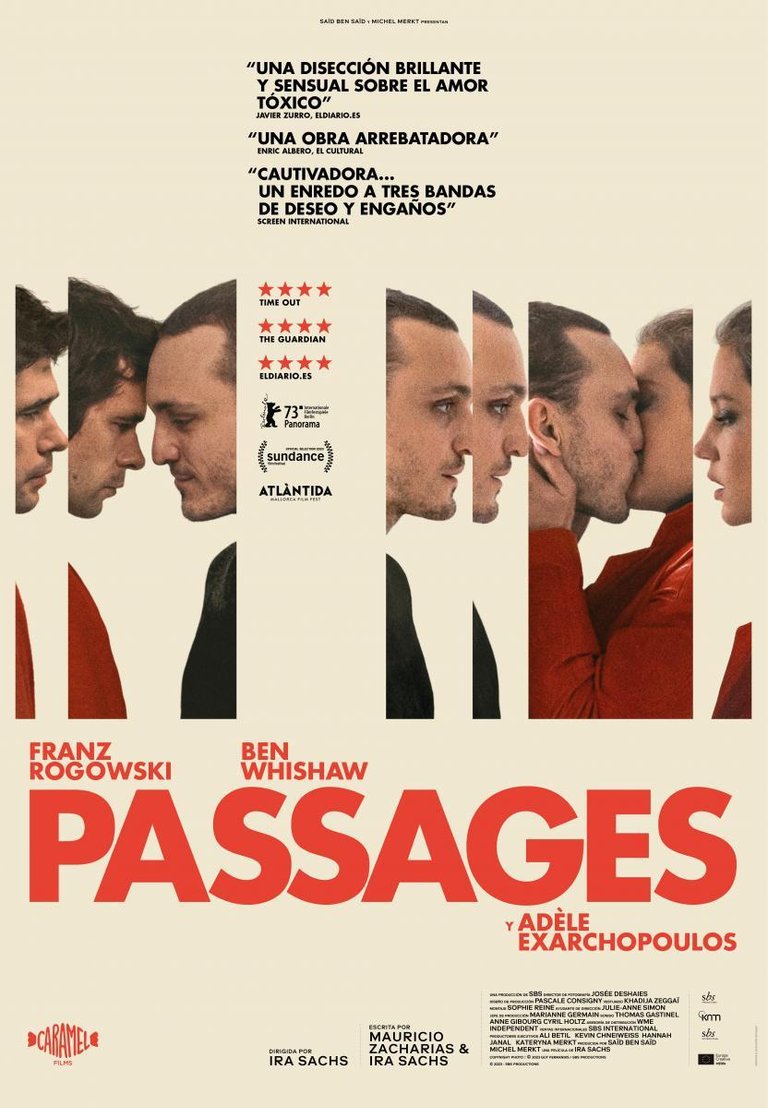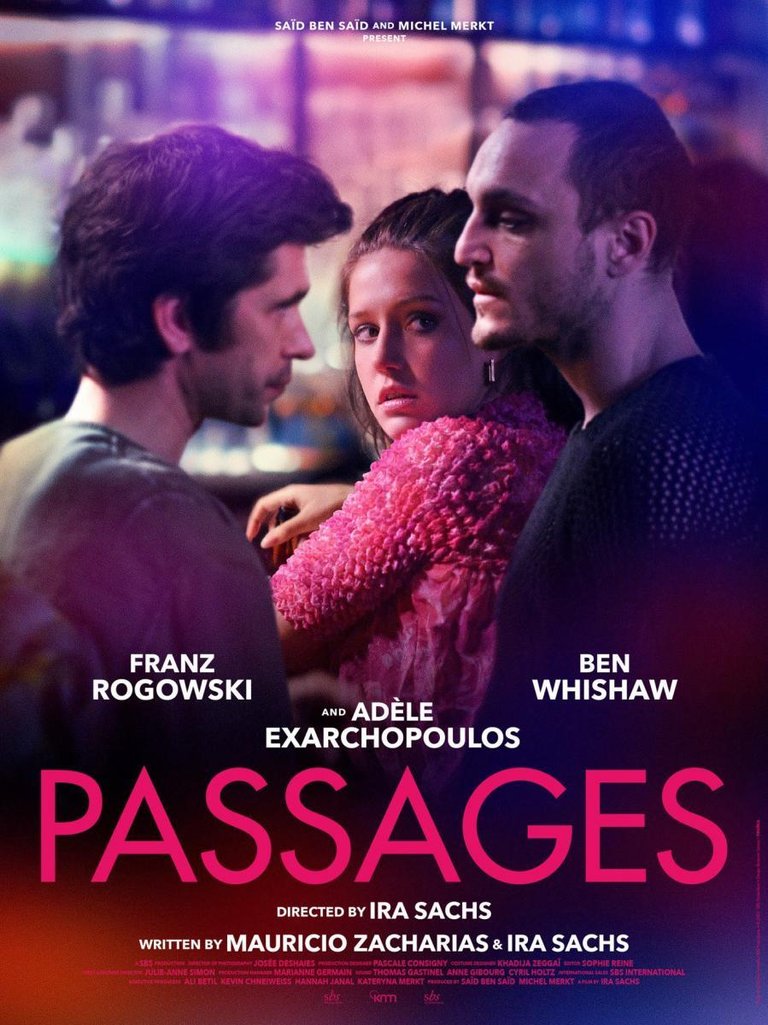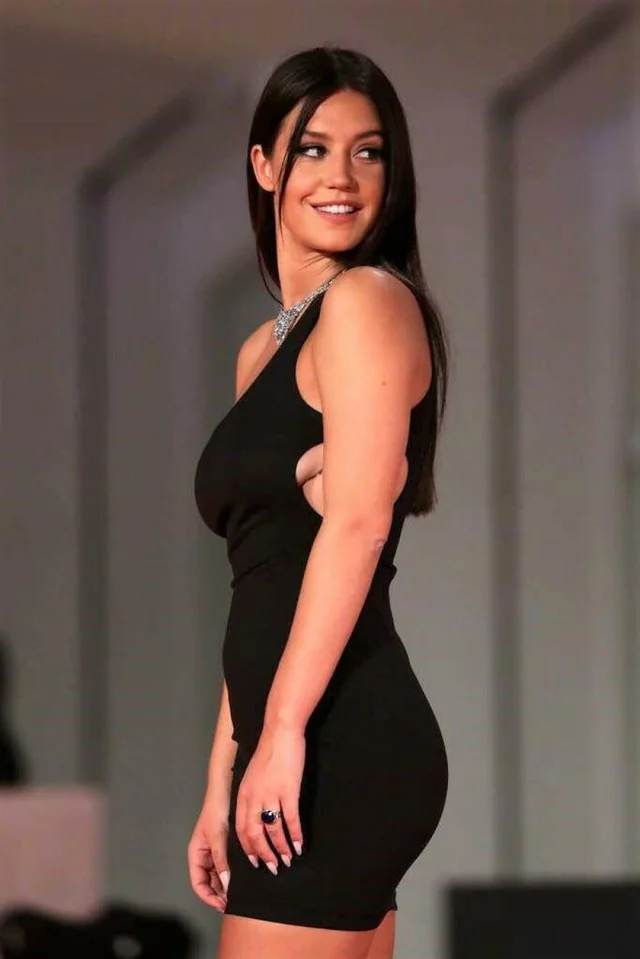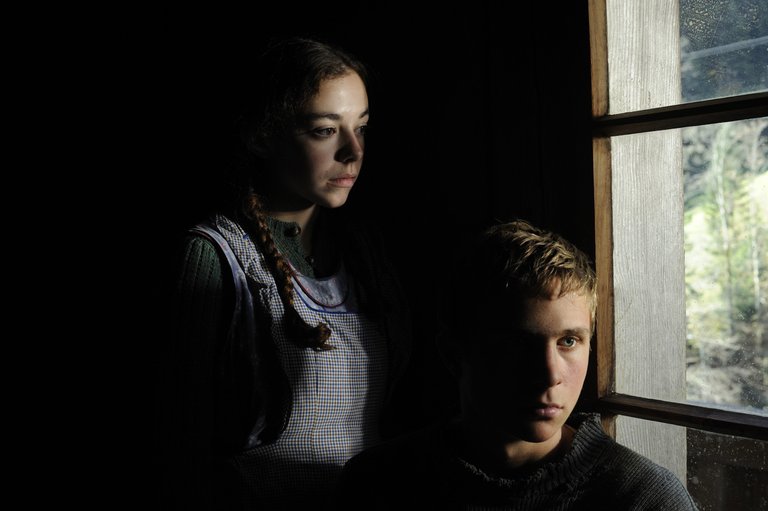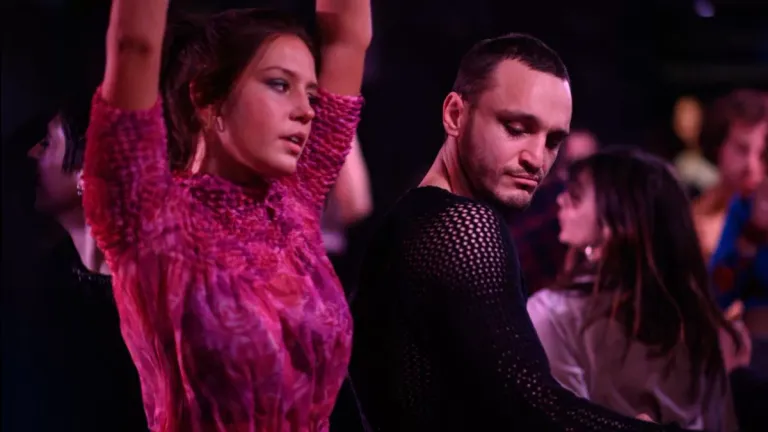
Una historia dramática, erótica y explosiva
Between last year and this year I have seen great movies that involve love triangles. The most memorable, without a doubt, Past Lives and Challengers (whose screenwriters, by the way, are a couple in real life) and I recently remembered that I had a pending film from last year that also involves three people, one of whom is the French actress Adèle Exarchopoulos, one of my favorite faces on screen.
Entre el año pasado y este he visto grandes películas que involucran triángulos amorosos. Las más memorables, sin duda, Past Lives y Challengers (cuyos guionistas, por cierto, son pareja en la vida real) y hace poco recordé que tenía pendiente una película del año pasado que también involucra a tres personas, una de las cuales es la actriz francesa Adèle Exarchopoulos, uno de mis rostros favoritos en la pantalla.
Directed by Ira Sachs and written by himself along with Mauricio Zacharias, Passages is a dramatic film that focuses on Tomas (Franz Rogowski), a young film director who is in the last days of filming his last movie. Tomas is married to Martin (Ben Whishaw) with whom he has a normal relationship, we would say, with its ups and downs, but whom he loves very much and who loves him. After the last day of filming, the entire team goes to celebrate at a club and at one point Tomas wants to dance, but Martin wants to go home to rest and he does so, leaving Tomas to enjoy his party and the celebration of his work. It is then that Tomas approaches Agathe (Adèle Exarchopoulos), first just to dance, but then, when they hang out in an apartment with other members of the film crew, Tomas sleeps with Agathe and that experience stirs him inside, so much, he wants to repeat it. Tomas tries to explain to Martin - such is the trust between the spouses - that he slept with a woman and that it was an exciting experience, but Martin feels hurt and from there the two begin to argue, resenting the relationship. While this is happening, Tomas begins to see Agathe more frequently and develop feelings for her, just as she does for him, which is why sooner rather than later Tomas finds himself in the middle of a crossroads in which he must decide which path to follow: continue by her husband's side, or abandon everything for Agathe.
Dirigida por Ira Sachs y escrita por él mismo junto a Mauricio Zacharias, Passages es una película dramática que se centra en Tomas (Franz Rogowski), un joven director de cine que se encuentra en los últimos días de rodaje de su última película. Tomas está casado con Martin (Ben Whishaw) con quien lleva una relación normal diríamos, con sus altibajos, pero a quien ama mucho y quien lo ama a él. Luego del último día de rodaje todo el equipo se va a celebrar a una disco y en un momento Tomas quiere bailar, pero Martin quiere irse a casa a descansar y lo hace dejando a Tomas que disfrute de su fiesta y la celebración de su trabajo. Es entonces cuando Tomas se acerca a Agathe (Adèle Exarchopoulos), primero sólo para bailar, pero luego, cuando comparten en un departamento junto a otros miembros del equipo de rodaje, Tomas se acuesta con Agathe y esa experiencia lo remueve por dentro, tanto, que quiere repetirlo. Tomas intenta explicarle a Martin - tal es la confianza entre los esposos - que se acostó con una mujer y que fue una experiencia emocionante, pero Martin se siente herido y a partir de allí los dos comienzan a discutir resintiendo la relación. Mientras eso ocurre, Tomas comienza a ver a a Agathe con mayor frecuencia y a desarrollar sentimientos hacia ella, igual que ella hacia él, razón por la cual más temprano que tarde Tomas se ve en medio de una encrucijada en la que debe decidir qué camino seguir: continuar al lado de su esposo, o abandonarlo todo por Agathe.
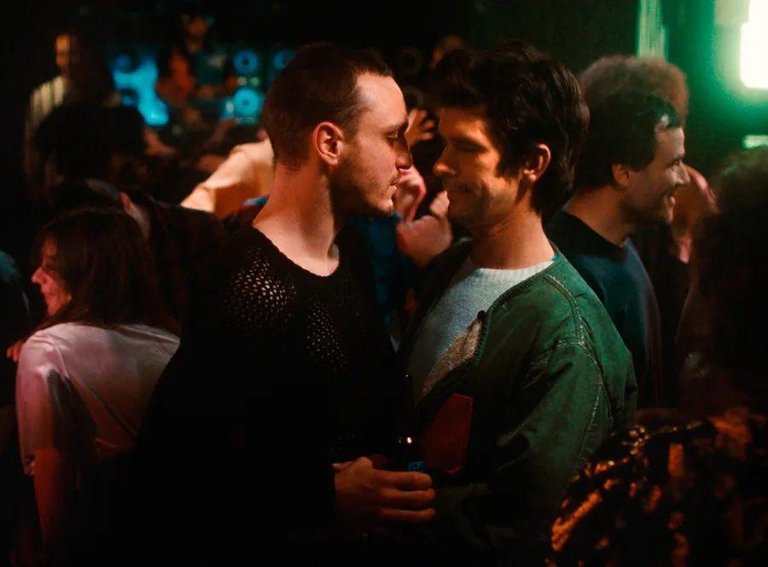
Logically, the decision is not easy at all. Tomas loves Martin and Agathe for different reasons. One side is the known, history and of course a homosexual relationship; the other is novelty, freshness and a heterosexual relationship, how can we compare them? how to decide? This inability to choose an option leads Tomas to go from one place to another, hurting the two people he loves and taking himself further and further down a path of no return.
Lógicamente, la decisión no es nada sencilla. Tomas ama a Martin y a Agathe por razones diferentes. Un lado es lo conocido, la historia y por supuesto una relación homosexual; la otra es la novedad, la frescura y una relación heterosexual, ¿cómo compararlas? ¿cómo decidir? Esa incapacidad de elegir una opción lleva a Tomas a ir de un lado a otro lastimando a las dos personas que ama y llevándose a sí mismo cada vez más hacia un camino sin retorno.
The relationships of the three, that is, Tomas' two relationships, are marked by the passion, jealousy, eroticism and his narcissism. Tomas is the protagonist of the story, but that does not make him the good one, because first he abandons Martin to go with Agathe, but then he leaves her and goes back to sleep with Martin whom he misses (he was also jealous that he had met to another man) and then returns to Agathe's side who can offer him and give him something that Martin never could. The paths along which Tomas's mind and heart stray are difficult to travel and produce complicated but plausible situations. The script, like the film, is quite dramatic. I don't think I remember a single scene of laughter, but I do remember many of tension, pain, crossroads, jealousy, desperation and above all that feeling that a person transmits when they feel lost because they have rejected all the hands that could have saved them. The performances of the three protagonists are very good. I had already seen Franz Rogowski in Undine, a film by Chritian Petzold where he shared the screen with the talented Paula Beer; We all recognize Ben Whishaw from one of his thousands of roles (in the latest James Bond with Daniel Craig, The Danish Girl, Cloud Atlas, Women Talking and of course Perfume: The Story of a Murderer).
Las relaciones de los tres, es decir, las dos relaciones de Tomas, están marcadan por la pasión, los celos, el erotismo y el narcisismo de él. Tomas es el protagonista de la historia, pero eso no lo hace el bueno, porque primero abandona a Martin para irse con Agathe, pero luego la deja a ella y vuelve a dormir con Martin a quien extraña (además tenía celos de que él había conocido a otro hombre) y luego vuelve al lado de Agathe que puede ofrecerle y darle algo que Martin jamás podría. Los senderos por los que se extravía la mente y el corazón de Tomas son difíciles de recorrer y producen situaciones complicadas, pero verosímiles. El guión, al igual que la película, es bastante dramática. No creo recordar una sola escena de risas, pero sí muchas de tensión, dolor, encrucijadas, celos, desesperación y sobre todo esa sensación que transmite una persona cuando se siente perdida porque ha rechazado todas las manos que lo podían haber salvado. Las actuaciones de los tres protagonistas son muy buenas. A Franz Rogowski ya lo había visto en Undine, una película de Chritian Petzold en donde compartió pantalla con la talentosa Paula Beer; a Ben Whishaw todos lo reconocemos de alguno de sus miles de papeles (en las últimas de James Bond con Daniel Craig, The Danish Girl, Cloud Atlas, Women Talking y por supuesto Perfume: The Story of a Murderer).
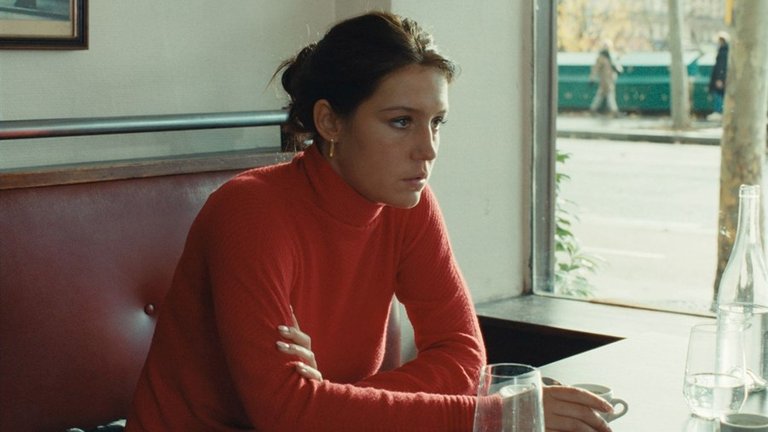
And what can I say about Adèle Exarchopoulos, who is one of my favorite French actresses? Her talent, beauty and presence on screen are always magnetic and overflowing. Since she made La vie d' Adèle and became the youngest person in history to win the Palme d'Or at the Cannes Festival, to each new role of her that I have seen (Zero Fucks Given, Les Cinq Diables), it has been demonstrated what a great actress she is.
¿Y qué decir Adèle Exarchopoulos que es una de mis actrices francesas favoritas? Su talento, belleza y presencia en pantalla son siempre magnéticas y desbordantes. Desde que hiciera La vie d' Adèle y se convirtiera en la persona más joven de la historia en obtener la Palma de Oro del Festival de Cannes, a cada nuevo papel suyo que he visto (Zero Fucks Given, Les Cinq Diables), queda demostrado que es una gran actriz.
Ira Sachs has managed to create in Passages a story with a lot of strength and emotion. Tomas is an intense, sensitive, passionate, narcissistic, tormented character, who is also in the middle of a great confusion into which he drags Martin and Agathe. Only those who have loved with great dedication and have suffered for it will be able to understand that sometimes the best act of love we can do for someone is to let them go, or not to look for them or not to let them find us. Although it hurts both sides, sometimes the only salvation is distance. Some may find that the script makes some very abrupt cuts, moving from one situation to another without anything to smooth the transition to the new information revealed, but that creates a greater impact on the viewer and of course it's intentional. I think the characters feel very real, credible and alive, which gives depth to their emotions and their respective dramas and I also think that the ending was what it had to be, although some will probably have the feeling that they want to know. more of the story, that is, beyond after the end credits. Passages is currently available on MUBI, where you can also check out some more of the filmographies of Franz Rogowski and Adèle Exarchopoulos and where there are always films that are not on any other platform (for example, they now have Oldboy and Perfect Days), have any of you seen Passages? I read you in the comments.
Ira Sachs ha logrado crear en Passages una historia con mucha fuerza y emoción. Tomas es un personaje intenso, sensible, apasionado, narcicista, atormentado, que además está en medio de una gran confusión a la que arrastra a Martin y a Agathe. Sólo quienes hayan amado con mucha entrega y hayan sufrido por ello sabrán entender que a veces el mejor acto de amor que podemos hacer por alguien es dejarlo ir, o bien no buscarle o no dejar que nos encuentre. Aunque le duela a ambas partes, a veces la única salvación es la distancia. Puede que algunos encuentren que el guión hace algunos cortes muy abruptos, pasando de una situación a otra sin algo que suavice la transición hacia la nueva información revelada, pero eso genera un impacto mayor en el espectador y por supuesto que es intencional. Creo que los personajes se sienten muy reales, verosímiles y vivos, lo que da profundidad a sus emociones y a sus respectivos dramas y también creo que el final fue el que tenía que ser, aunque probablemente a algunos les va a quedar la sensación que querer saber más de la historia, es decir, más allá después de los créditos finales. Passages está actualmente disponible en MUBI, en donde también pueden revisar algo más de las filmografías de Franz Rogowski y Adèle Exarchopoulos y en donde siempre hay películas que no hay en ninguna otra plataforma (por ejemplo, ahora tienen Oldboy y Perfect Days), ¿alguno de ustedes ha visto Passages? Los leo en los comentarios.
